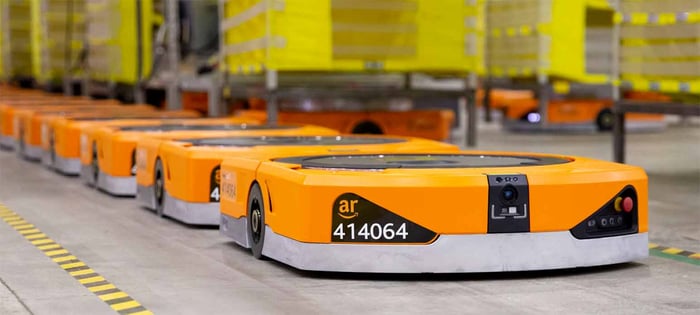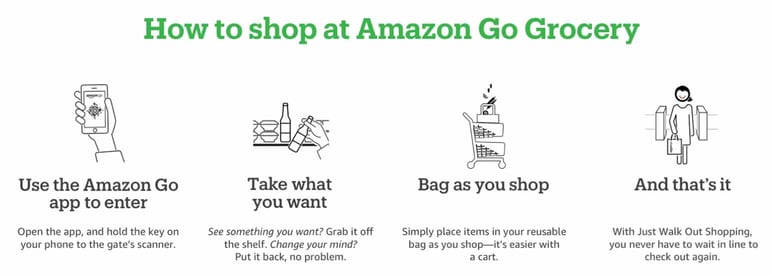
In 2019 Walmart was unveiling an artificial intelligence-based store, called "Intelligent Retail Lab," in which a network of cameras tracked customer movements among more than 30,000 products.
Customers were still required to pay for their purchase at a traditional checkout attended by an employee, but data collected by the store's cameras and other sensors determined which products to replenish and monitored the preservation of more delicate or perishable foods.
Since then, the debate about the arrival of artificial intelligence in ecommerce and retail has shifted from one of shock and disbelief to one of total conviction. Artificial intelligence will be (and already is being) a key technology to optimize the future of brands and retailers in a more digitized and competitive market since last year.
The future of artificial intelligence in ecommerce is already the present
According to analysts such as Tractica, the benefits brought by artificial intelligence will grow to $36.8 billion by 2025.
And the most trusted source in analyzing consumers, Google, claims that 76% of people already use some form of artificial intelligence system on a weekly basis and 61% have a smart device.
Although the levels of adoption of this technology among consumers and industry are very different from country to country, it is undoubtedly the determining step for supply to be 100% aligned with buyers' expectations.
Between boosting productivity and reducing waste and errors, artificial intelligence for ecommerce and brands has applications in the manufacturing process, the supply chain and customer service.
Let's take a brief look at the most important ones that any retailer could start to study and apply.
5 keys to using artificial intelligence in ecommerce
Logistics support
It is no longer uncommon in many manufacturers' and distributors' warehouses: a network of automated arms, machines and vehicles that streamline tasks hitherto in the hands of employees.
And no, robots do not come to eliminate work, but to make the management of the logistics network and the supply chain much more precise and faster, which positively impacts sales and customers by reducing bottlenecks in launches and stock replenishment.
Artificial intelligence systems make it possible to analyze in real time how many products are on the warehouse shelves, which ones should be released first according to their date of entry, and will be able to predict when to replenish based on the pace of sales and dates or seasons with high demand.

One more argument in favor of the friendship between artificial intelligence and humans: it will also determine when more employees are needed at busy times. By analyzing the behavioral history of stock coming in and out of the warehouse, artificial intelligence is also gathering valuable information about buying patterns, the performance of all products in the catalog and sales trends according to shipping zones or regions.
Multichannel commerce has greatly complicated the management of the logistics network, and this technological support will be very important to ensure error-free processes. Employees had to manage the reception of product information, stocks, orders and customers, while the support of AI systems will allow these analyses to be done faster and with 100% quality assurance.
For example, PIM technology is already automating the management of product information sent to all channels and participants in the sales process, and analyzes data quality to detect errors and enrich content with no manual tasks. PIMs of the future such as Sales Layer know that artificial intelligence is the allied technology and are starting to integrate functionalities in this direction to make the job of manufacturers and sellers easier, and improve the customer buying experience.
Sales predictions
From the analysis of the products that leave the warehouse most often, conclusions can be drawn about higher demand peaks according to product type, customer and region.
In this sense, another valuable predictive task is the analysis of the pricing strategy in order to apply changes at the really appropriate times, depending on the degree of product novelty, demand, seasonal trends and competitors.

In physical stores, artificial intelligence will also be of great help, and even more so in this day and age, as it allows counting the amount of people in the store, understanding where they go the most often and in which time slots there is more attendance. With this data, retailers will be able to make better decisions about product layout and the spatial organization of stores.
Fraud prevention, on the rise in ecommerce, will also be instantaneous with artificial intelligence analysis both in online channels and in stores where automatic payment is applied.
Discovering the perfect product
By opening Google or asking Siri a question, the consumer seeks to save time and reduce friction in queries. Searching for "beach towel," scouring multiple brand websites, comparing the price of the perfect towel across retailers, reading reviews from credible sources, deciding to go to the store to pick it up... It's a process full of possibilities for the shopper, but also tedious.
Imagine reducing all that to asking a question or sending a photo to an artificial intelligence system. It would be able to locate the perfect product or facilitate the discovery of new products, and make more accurate recommendations and findings, in a matter of seconds.
100% personalized online and in-store experience
There is increasing talk about the importance of personalizing the customer experience. However, until now that has consisted of segmentation strategies.
Thanks to artificial intelligence, the experience will be truly 100% personalized. Not conclusions and actions applied equally to all female under-20 students, but to one particular 17-year-old female engineering student.
We've seen it in Hollywood movies: people walking down futuristic streets and a 3D ad recognizes them by name, appealing to them to take an interest in your product or service. And it's no longer science fiction: biometric technology can actually identify customers, remember their behavior on other visits, or allow them to pay with just a smile, as the Face++ system in China allows.
Both in online shopping and in physical stores, artificial intelligence can assist the customer in fitting rooms, locating products, resolving doubts and during checkout, such as the Amazon Go system that tracks the products that the buyer adds to his cart, without the need to go through a checkout to complete the payment.

Chatbots: artificial intelligence is already here
Despite the reluctance of some consumers, manufacturers and retailers towards this technology, they are already interacting with it on a daily basis.
Apart from the voice assistant functions in smartphones and many other household devices, one of the first artificial intelligence functions to have been implemented naturally and quietly has been chatbots.
Customer service chats based on chatbots, i.e. artificial intelligence that "converses" with the buyer, can answer doubts and questions about the product catalog, search for items, consult stock, make suggestions and even complete the purchase and payment process.
They have become a useful complement for customers and sellers, as they can offer 24/7 attention and increase their agility by answering short and easy to solve queries. In addition, AI systems are becoming increasingly sophisticated and are able to learn from these customer dialogues in order to refine similar interactions with other buyers.

Resisting artificial intelligence is very much a 2000s argument. This past year has shown that the speed of digitization of commerce and consumers is accelerating, and manufacturers and retailers can only benefit from gaining a head start on cutting-edge technologies.
Any tool equipped with artificial intelligence capabilities will serve to improve business innovation, customer experience, the business operations network and the performance of each sales channel.
You don't need to start with an intimidating robot: artificial intelligence is more on hand than you think, as in a PIM system that automates your product catalog management and helps you review its quality and enrich it. Try it for free here or ask us for a demo with a specialist, before the future gets ahead of you in the commercial race.






.png?width=520&name=Blog%20Partner%20(3).png)

.png?width=520&name=Blog%20Partner%20(1).png)
